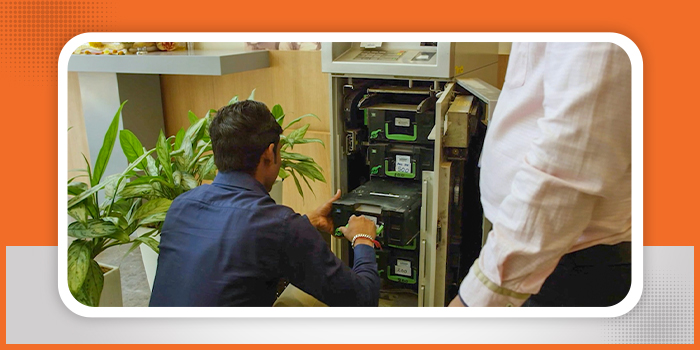In modern day banking, ATMs have proven to be essential for overall convenience,enabling customers to access their funds and perform transactions around the clock. This means enhanced focus on its safety and allied services such as the cash management. Initiatives such as cassette swapping by companies like Securevalue India, a wholly owned cash management subsidiary of AGS Transact Technologies Ltd, is expected to boost the efficiency and security of cash management process for its esteemed clientele such as Banks, Financial Institutions, and large retailers.
Understanding Cassette Swapping
Cassette swapping refers to the process of replacing cash cassettes within ATMs or CRMs (Cash Recycler Machines) as a means to streamline operations and strengthen security measures. ATMs are equipped with multiple cash cassettes, each containing a specific denomination of currency. When a cassette runs low on funds, it triggers an alert prompting replenishment by service personnel.
In India, open-cash replenishment or cash top-up is a common practice carried out manually by an ATM personnel on the spot. This means lack of transparency in the process or exposure to risk and mishap.
In order to mitigate risks involved in open cash replenishment/ top-up, The Reserve Bank of India or RBI vide it’s circular dated 12.4.2018 advised banks to consider using lockable cassettes in their ATMs which should be swapped at the time of cash replenishment. This ensures replenishment of the ATM without any manual intervention of an ATM personnel.
Strengthening Security Measures
Cassette swapping, a global practice within cash management industry, plays a pivotal role in strengthening security measures within the ATM ecosystem. It greatly reduces the risks associated with process of manual cash replenishment. Further, by regularly rotating cash cassettes, banks can mitigate the risk of the unlawful tactics by fraudsters to steal money from unsuspecting ATM users.
Furthermore, cassette swapping facilitates the implementation of advanced security features such as tamper-resistant seals. These measures serve as obstacles against unauthorized access and fraudulent activities, safeguarding both the integrity of ATM transactions and the financial well-being of customers.
Enhancing Efficiency
The adoption of cassette swapping brings forth a multitude of benefits, key among them being enhanced operational efficiency. It can help eliminate tampering of currency and therefore counterfeits during the transit, subsequently reducing discrepancies in the accounting or reconciliation of cash. Further, by proactively managing cash levels within ATMs and CRMs, banks can mitigate the risk of machines running out of funds during peak usage periods. Such a proactive approach reduces the likelihood of service disruptions, ensuring uninterrupted access to banking services for customers.
Moreover, cassette swapping enables financial institutions to optimise their cash management services. By strategically allocating cash cassettes based on transaction volumes and usage patterns, banks can minimize the frequency of replenishment visits while maximizing the operational availability of ATMs. This translates into cost savings and greater operational efficiency for both banks and ATM service providers.
Looking Ahead
As the financial landscape continues to evolve, the role of cassette swapping in ATMs and CRMs is positioned to become increasingly prominent. With its ability to enhance efficiency and strengthen security measures, this practice represents a significant shift in cash management strategies within the banking and Financial Services industry. A successful adoption of this practice can also imply additional revenue earning mechanisms for MSPs in the long run.
In conclusion, cassette swapping in ATMs and CRMs, championed by SVIL of AGS Transact Technologies, showcases banking’s pursuit of excellence. It optimises cash management and strengthens security, ensuring seamless banking experiences.


